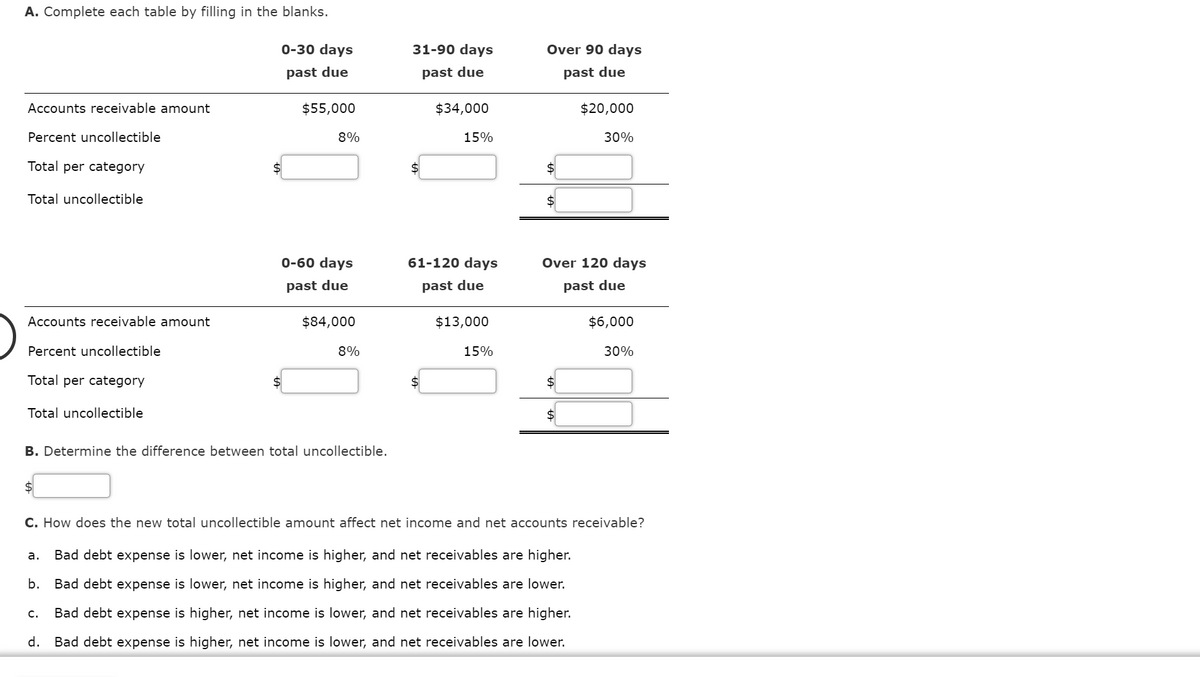A. Complete each table by filling in the blanks. 0-30 days 31-90 days Over 90 days past due past due past due Accounts receivable amount $55,000 $34,000 $20,000 Percent uncollectible 8% 15% 30% Total per category Total uncollectible 0-60 days 61-120 days Over 120 days past due past due past due Accounts receivable amount $84,000 $13,000 $6,000 Percent uncollectible 8% 15% 30% Total per category 24 Total uncollectible B. Determine the difference between total uncollectible. C. How does the new total uncollectible amount affect net income and net accounts receivable? а. Bad debt expense is lower, net income is higher, and net receivables are higher. b. Bad debt expense is lower, net income is higher, and net receivables are lower. c. Bad debt expense is higher, net income is lower, and net receivables are higher. d. Bad debt expense is higher, net income is lower, and net receivables are lower.
A. Complete each table by filling in the blanks. 0-30 days 31-90 days Over 90 days past due past due past due Accounts receivable amount $55,000 $34,000 $20,000 Percent uncollectible 8% 15% 30% Total per category Total uncollectible 0-60 days 61-120 days Over 120 days past due past due past due Accounts receivable amount $84,000 $13,000 $6,000 Percent uncollectible 8% 15% 30% Total per category 24 Total uncollectible B. Determine the difference between total uncollectible. C. How does the new total uncollectible amount affect net income and net accounts receivable? а. Bad debt expense is lower, net income is higher, and net receivables are higher. b. Bad debt expense is lower, net income is higher, and net receivables are lower. c. Bad debt expense is higher, net income is lower, and net receivables are higher. d. Bad debt expense is higher, net income is lower, and net receivables are lower.
Chapter9: Accounting For Receivables
Section: Chapter Questions
Problem 11EA: Mirror Mart uses the balance sheet aging method to account for uncollectible debt on receivables....
Related questions
Question

Transcribed Image Text:Mirror Mart uses the balance sheet aging method to account for uncollectible debt on receivables. The following is the past-due category information for outstanding receivable debt for 2019.
0-30 days
31-90 days
Over 90 days
past due
past due
past due
Accounts receivable amount
$55,000
$34,000
$20,000
Percent uncollectible
8%
15%
30%
Total per category
?
?
?
Total uncollectible
?
To manage earnings more efficiently, Mirror Mart decided to change past-due categories as follows.
0-60 days
61-120 days
Over 120 days
past due
past due
past due
Accounts receivable Amount
$84,000
$13,000
$6,000
Percent uncollectible
8%
15%
30%
Total per category
?
?
?
Total uncollectible
?
Complete the following.

Transcribed Image Text:A. Complete each table by filling in the blanks.
0-30 days
31-90 days
Over 90 days
past due
past due
past due
Accounts receivable amount
$55,000
$34,000
$20,000
Percent uncollectible
8%
15%
30%
Total per category
$
Total uncollectible
$
0-60 days
61-120 days
Over 120 days
past due
past due
past due
Accounts receivable amount
$84,000
$13,000
$6,000
Percent uncollectible
8%
15%
30%
Total per category
$
Total uncollectible
$
B. Determine the difference between total uncollectible.
2$
C. How does the new total uncollectible amount affect net income and net accounts receivable?
а.
Bad debt expense is lower, net income is higher, and net receivables are higher.
b.
Bad debt expense is lower, net income is higher, and net receivables are lower.
c.
Bad debt expense is higher, net income is lower, and net receivables are higher.
d.
Bad debt expense is higher, net income is lower, and net receivables are lower.
Expert Solution
This question has been solved!
Explore an expertly crafted, step-by-step solution for a thorough understanding of key concepts.
This is a popular solution!
Trending now
This is a popular solution!
Step by step
Solved in 4 steps

Knowledge Booster
Learn more about
Need a deep-dive on the concept behind this application? Look no further. Learn more about this topic, accounting and related others by exploring similar questions and additional content below.Recommended textbooks for you

Principles of Accounting Volume 1
Accounting
ISBN:
9781947172685
Author:
OpenStax
Publisher:
OpenStax College

Intermediate Accounting: Reporting And Analysis
Accounting
ISBN:
9781337788281
Author:
James M. Wahlen, Jefferson P. Jones, Donald Pagach
Publisher:
Cengage Learning

Cornerstones of Financial Accounting
Accounting
ISBN:
9781337690881
Author:
Jay Rich, Jeff Jones
Publisher:
Cengage Learning

Principles of Accounting Volume 1
Accounting
ISBN:
9781947172685
Author:
OpenStax
Publisher:
OpenStax College

Intermediate Accounting: Reporting And Analysis
Accounting
ISBN:
9781337788281
Author:
James M. Wahlen, Jefferson P. Jones, Donald Pagach
Publisher:
Cengage Learning

Cornerstones of Financial Accounting
Accounting
ISBN:
9781337690881
Author:
Jay Rich, Jeff Jones
Publisher:
Cengage Learning